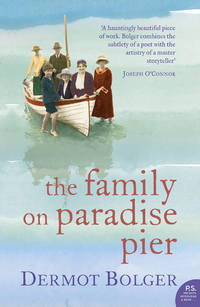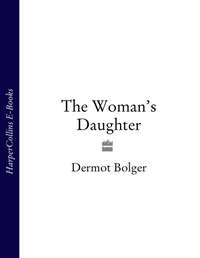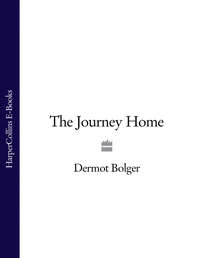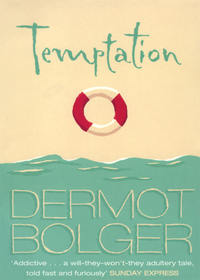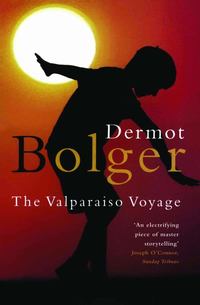
Полная версия
Father’s Music
It took intense persuading to get Liam to visit a gay club, and he only agreed when Garth repeatedly explained how discreet the one he had chosen was. It was in the taxi that Garth mentioned Luke, asking Liam if he remembered a wedding party in the Irish Centre.
‘The place was packed,’ Liam replied. ‘I play it once a month. I won’t know anyone there.’
‘There’s a guy Tracey wants to know about,’ Garth pressed him. ‘From Dublin but living here. His name is Luke and he works in tiles. He knew you or a fair amount about you.’
I realised Garth had never told Liam how he came to be in that coffee shop and he was taking a risk for me now.
‘What did he claim to know?’ Liam was defensive again.
‘Where I might meet you, for example.’
Liam lowered the window so that cold air filled the cab. The West Indian driver drove with sullen fury, jerking us about. Liam’s good humour had vanished as he digested the news of someone else knowing his movements.
‘And that it might be worth your while going there?’ Liam asked. Garth said nothing, but Liam leaned back, tense now with the world shrinking in his mind.
‘I don’t know anyone called Luke,’ he said eventually.
I recognised the club when we got there. Garth had taken me there once with Roxy and Honor. I always loved gay clubs. They had the best sounds and least hassle and gay men were great dancers around you. The club was packed. At first Liam made it clear that I was with Garth and he was with Jack Daniels. He downed three of them neat. I could imagine him lying awake, perpetually wondering who knew and who didn’t. Now Luke was another name for his list, closer to home than us and therefore more dangerous.
Garth and I danced alone at first and only when Liam was approached by men did we persuade him to join us. He appeared awkward but then, as he relaxed, he took over our part of the floor, slipping into routines which had looked hackneyed in the Irish Centre. Now, though the music was utterly different, they were breath-takingly joyous. Men stopped to watch, infected by his boyish animation. Nobody does Elvis in a gay club, but he did, the younger Elvis, wide-eyed and sexually innocent, before Colonel Parker’s gimmicks killed him off. I remembered Garth’s story and realised that previously I was watching a dancing chicken. Now I saw the man Garth had always guessed at. The music halted and we returned to the bar for more drinks. Liam took a long sip, his hair damp with sweat.
‘You’re wrong about something,’ I said after Garth went to the gents. ‘I do know sean-nós singing.’
Liam looked at me in surprise, struggling to remember his outburst in the pub. ‘What does it sound like?’
I tried to recall the unaccompanied drone of an old man’s voice through a listening post at dawn.
‘Like a sperm-whale clapped out after fucking twenty leagues under the sea.’
Liam laughed, draining his glass. ‘Jaysus, you’re not far off the mark,’ he replied.
‘I’ve only heard it once,’ I confessed. ‘It’s probably an acquired taste, like Jack Daniels.’
‘Only words count in sean-nós,’ Liam said. ‘The voice is an unadorned instrument to get them out. Your friend Luke would know sean-nós singing.’
‘You know who he is?’
‘I saw him talk to you in the Irish Centre,’ Liam replied. ‘He’s been pointed out to me at traditional sessions over here. He drinks by himself, taking everything in, even me, obviously. He wouldn’t be a regular and would only come for the music. I mean he’d have nothing in common with the people you’d meet at a traditional gig.’
‘Isn’t that music popular in Ireland?’ I asked.
‘Yes and no,’ he replied. ‘It won’t die out, but country and western is what’s big in Ireland. Then there’s rock music, U2, Sinead O’Connor, The Cranberries. In Dublin you can’t spit without hitting rock stars chilling out. But traditional music has a world of its own. That’s why Luke stood out. He’s a Duggan, if you know what I mean.’
‘I don’t,’ I said. ‘Who are the Duggans?’
A man in a leather jacket asked Liam to dance and he shook his head, watching Garth return. Tomorrow Liam might regret this but now he was drunk and enjoying himself. He wanted to dance again and this time I knew three would be a crowd.
‘Traditional music is like a religion in parts of the West or Kerry or Donegal,’ Liam said. ‘But Luke’s types are generally more into James Last. All those lush strings to drown out the noise of knee-caps being broken. Take my word and keep away. The shagging Duggans.’ He laughed, heading for the throbbing beat of the dance floor. ‘You don’t expect to walk into a session and see someone from the biggest shower of thugs in Dublin tapping his feet to the tunes, now do you?’
FIVE
THE FOLLOWING SUNDAY NIGHT I took the tube across London, staring at faces on the platforms and then at my own face reflected back as the train careered through the bowels of the city. People got on and got off, high-heeled girls chattering, lone men with Sunday supplements, everybody rushing somewhere. I might have stayed on the Circle Line all evening, watching the same stations rush back at me. Anywhere was better than a second Sunday alone in that flat.
At Blackfriars the old woman got on. Temple, Embankment, St James’s Park. Within minutes I knew she was going nowhere and that she could sense I was faking a destination too. The carriage was empty. I felt her staring. I thought she was lonely and wanted to talk, then I realised her eyes were taunting me. ‘I had friends at your age,’ she seemed to say, ‘I’d a family and a purpose.’ Her eyes were bird-bright. She looked like the sort of woman you saw in postcards of Trafalgar Square, with pigeons clouding the air at her shoulders as she tossed broken bread probably soaked with paraquat. I stared back and she held my gaze as if declaring this carriage as her private kingdom.
Even without her eyes taunting me I always knew that eventually I’d get off at Edgware Road. I had simply been delaying the moment, trying to fool myself that I wasn’t returning to where I had waited for Luke a fortnight before. It was three minutes’ walk from the station, but it seemed longer. Ten minutes would bring me to the splendour of Marylebone Road, but here the streets seemed more Arabic than English.
It was a strange location for an Irish Centre, surrounded by the scent of spices and taped muzak from cheap restaurants. A notice in a window promised live belly dancing at weekends. I stared at the few diners through the glass. I stood in the doorway opposite the Irish Centre and watched people come from a meeting upstairs. Some left while others drifted towards the bar where rock music was starting. I wanted the street empty like on that night. I closed my eyes but everything felt different.
Loud voices crossed towards me. I walked on so quickly that I was almost past the hotel when I stopped. The lobby was deserted, the receptionist absent from her desk. A stag’s head protruded above the unlit fireplace, looking like he’d been strangled by cobwebs. The Irish voices were at my shoulder now. I pushed the door open and stepped into the lobby. Voices chattered down a nearby corridor. I had no excuse if the receptionist came back. I just ran and reached the bend of the stairs before hearing footsteps below and a tray of glasses being set down.
I walked up the final steps and down a dim corridor of trapped smells. Any pretence of glamour ended with the carpet on the stairs. These doors hadn’t encountered paint for years. A television blared behind one. I came to what had briefly been our room. There wasn’t a sound within. I knocked. If I heard footsteps I was going to run. I just wanted to see inside, to touch the bed we’d never used, the chair and damp wallpaper. I wanted to lay the ghosts of that night to rest.
Down the corridor I heard footsteps. I panicked and tried the handle. The door opened, surprising me. Luke sat in that same chair, facing the window with his back to me. A walkman was over his head and he was absorbed in whatever was playing. His hands were out of sight on his groin. It’s a dirty tape, I thought, he’s masturbating. I had turned to go when he lifted his hand, which held a small tipped cigar. He took a pull, then slowly released smoke into the air.
Liam Darcy’s description came back: the biggest shower of thugs in Dublin. In the taxi home he had been more expansive, detailing the armed robberies for which the most famous of them, Christy Duggan, had become a national figure, after the IRA showed how easily it was done. When robberies became common in Dublin and security tightened, Christy Duggan had orchestrated bank raids which paralysed isolated country towns. The police could never prove anything despite twenty-four-hour surveillance for two years, but, according to Liam, everything about the Duggans was common knowledge. People even knew when Christy’s gang were making a hit because he would drive up and down outside police headquarters. Libel laws meant his name never appeared in the papers, which referred to him as ‘The Ice-man’.
I wasn’t sure how much of this was the Jack Daniels talking, but Liam had kept us in stitches with the bizarre nicknames by which, he maintained, Dublin criminals were known: the Wise-cracker, the Commandant, the Cellar-man. The aliases had turned them into comic book characters, but now, watching Luke, their names and crimes became flesh and blood. He had no idea I was there. I liked the sense of power that gave me. I could watch or leave. If I were his wife I could plunge a scissors into his neck. His jacket lay on the bed. I could steal his credit cards or car keys. Or, if I had any sense, I could turn and run, leaving the door ajar so that he’d suspect someone had stood there, but would never know whether it was me.
There was a click as the tape ended and Luke stirred. This was the moment to slip away. But I stayed there until he turned, slowly as if sensing someone. He seemed neither surprised nor pleased to see me. If any emotion showed it was a relief he tried to cloak. Perhaps it was my imagination gone wild, but I got the impression that he had half thought he was about to be shot.
‘You’re a week late,’ he said quietly, drawing the headphones down. A woman’s voice, in a language I couldn’t understand, drifted along the corridor. Her closeness might have reassured me, only I found I wasn’t nervous. ‘Still, you’re worth the wait.’
The bed was made up this time. A sink in the corner had a cracked mirror above it. I had shared such a room once, running away with my mother.
‘How did you know I’d come?’
‘I didn’t.’ He watched me closely. ‘Last week I held out some hope, but this week I’d none at all.’
The window pane rattled as a truck passed. There were footsteps on the ceiling and hot-tempered voices.
‘Then what are you doing here?’
Luke rose to put his jacket on, slipped the walkman into the pocket, then shrugged and sat on the bed.
‘Why shouldn’t I be here?’ he said. ‘It’s as good as anywhere else.’
‘What’s wrong with staying at home?’
He scrutinised me and I stared back, feeling this was a contest of wills. ‘That’s complex,’ he said, ‘private.’
‘Poor little you.’ I tried to mask my elation behind mockery, not wanting to admit to myself how much I had hoped he’d be here.
‘We married young,’ Luke said, so openly that my jibe sounded cheap. ‘A shotgun job, a miscarriage and then a child on top of us before we knew who we were. I kept growing and she didn’t. Maybe she’d see it different, but either way there’s not much left in common.’
‘Where does she think you are now?’
‘Stock checking, doing the books. All the things I’ve no time for during the week.’
‘She must think you’re a great provider. The businessman who never stops.’
‘She wants for nothing and I’ll make sure she never does.’ Anger entered his tone. I knew he wouldn’t be ridiculed. In truth I’d simply been buying time.
‘If I hadn’t showed up would you have come next Sunday?’
‘I don’t know.’ Luke looked around. ‘Last week I found I liked it here. I could hear myself think. It holds good memories, this room.’
Everything looked cheap and worn. Television stations blared through the walls on either side of us.
‘Not for many people it doesn’t,’ I said. ‘It’s a kip.’
‘That depends on who you shared it with.’
‘I didn’t come for that,’ I said sharply. There were footsteps on the stairs. I stepped back into the corridor so I could be seen.
‘Don’t be frightened,’ Luke said.
‘I’m not frightened of anyone.’
‘We were both very drunk,’ he went on. ‘I’m afraid I don’t even know your name.’
‘I know yours,’ I said. ‘The Duggans are famous.’
He relit his cigar, tipping away dead ash. ‘An anonymous fucking hotel,’ he said, with quiet resignation. ‘You’d think at least here I might be known for myself.’
‘That’s the problem with infidelity, things always come out.’ My defensive mockery was replaced by a relaxed teasing. ‘All your family are the same, I hear. Cut-throats, with more nicknames than convictions.’
‘We specialise in the white slave trade,’ he replied, straight-faced.
‘Drugged virgins shipped off in crates of wall tiles.’
‘You’re in luck,’ he said. ‘There’s an EC moratorium on virgins so we’re branching into more experienced types.’
His assertiveness was gone, but a sardonic watchfulness remained. I was surprised by how attracted I felt to him as we toyed with each other. It felt like foreplay, except that I was never going to enter the room. Even when he smiled I sensed his sombreness. The image of him dead in that chair had a prophetic feel. I wondered if I had been an assassin would Luke have greeted me with the same resigned shrug? Yet he gave no impression of being anything other than a small-time businessman. He even seemed to delight in shrinking his world down to two stores in rundown London suburbs. I remembered how he stood out from his family that first time we’d met.
‘I want to show you something,’ he said.
‘What?’
He arose without replying. We walked downstairs. The receptionist was the same age as myself. She lifted her gaze from a magazine to scrutinise us, trying to make Luke feel older.
‘She’s my daughter,’ Luke said, deadpan, returning the key. ‘I can never deflate those dolls by myself.’
We reached the street before starting to laugh. Inside his car I asked him to play the tape he had been listening to.
‘You won’t like it,’ he said.
‘Try me.’
It was Irish fiddle music from somewhere called Sliabh Luachra, recorded live with bodies moving about and background coughing. Luke had taped it off an Irish radio programme.
‘What do the names mean?’ I asked. ‘The Rambling Pitchfork or Boil the Breakfast. They don’t make sense.’
He glanced across, surprised at my knowledge. ‘Why should they? Names aren’t important. A tune might start in one county and if a travelling fiddler liked it, he’d carry it home with a different name. Only the notes counts.’
‘Why do they all sound the same?’
‘They don’t,’ Luke said. ‘Listen.’ He spoke quietly, showing where each tune slipped effortlessly into the next reel in the set. His enthusiasm made him seem boyish. Yet his suit gave the impression of someone impersonating a Bulgarian trade diplomat. I told him so and he laughed, claiming most people never saw beyond an expensive suit. It was a good way to remain invisible.
‘Why do you want to be invisible?’.
‘I’m a private man,’ he said.
‘Enjoying your secrets.’
‘Contradictions,’ he replied. ‘Secrets are dangerous, they self-destruct. Contradictions are different. We’re born under the sign of contradiction. Without them we’d still live in the trees.’
‘Which am I?’
He looked across and raised the tape. ‘You’re a bonus,’ he said.
‘Luke, you’re full of shit.’ I laughed and he joined in, savouring the joke against himself. I didn’t want to talk anymore, I wanted to hear that music. Previously I’d only ever heard snatches, but now it filled me with curious elation. It was seductive. I wondered at how my father’s playing had once lured my mother to swap Harrow for the wilderness of Donegal.
I almost told Luke about my father, then remembered his remarks about travellers. I felt a flush of shame not even Gran might have fully understood. For her the problem with my father had been a matter of class, but with Luke it was a matter of caste. Suddenly I felt like an untouchable, an Irish tinker’s child.
‘You’re quiet,’ Luke said, watching me. I wanted to strip away that expensive suit and drag him down a peg.
‘Your type don’t normally like this music.’
‘Who are my type?’ he replied coolly.
‘People from the slums of Dublin.’
‘I was born in no slum,’ he said. ‘Is that what you’re after? A bit of rough trade, some peasant Paddy to fuck?’
He seemed about to stop the car, then changed gear and put his foot down.
‘I didn’t mean to insult …’
‘You did,’ he said, taking a corner at speed before slowing down, his voice more controlled. ‘People put you in your box and never let you out. That’s why I left Ireland.’
‘Is London any freer?’
‘It’s different at least. You’re just another thick Mick to be patronised.’
The tape ended. He turned it over. There was a hiss before music filled the car again.
‘What are you after?’ Luke said.
‘I don’t know. I wanted to see who you were. I’m not some … I’m not a tart.’
‘I know.’
I stared at the passing streets. It might have been better if he had stopped the car and let me out. This evening we were sober and aware of the void between us.
‘What are you looking for?’ I turned the tables.
‘I don’t know either.’ I felt he was being painfully honest. ‘Every morning I brush my teeth but the staleness won’t go. I get on with life but it’s not me in this suit. I’ve made myself numb so as not to feel this ache.’
‘Why don’t you leave?’
‘Running away solves nothing,’ he said. ‘It still leaves tomorrow to face.’
‘Is your brother a master criminal?’ I asked.
‘The Ice-Man?’ Luke laughed. ‘That sells papers but Christy can hardly tie his shoe-laces. He’s no saint, but if he’s a gang lord why hasn’t he two shillings to rub together? I’m not defending him, but he’s your ordinary decent small-time crook. Nobody in the crime world takes him seriously, but he’s got a big mouth and papers like that. Two of our uncles were famous hard men. A family is like an area, once it gets a reputation the truth doesn’t matter. Real criminals keep their heads down, they like it that way. And they’re only trotting behind the the big scams in fraud by accountants. But that’s not sexy enough, newspapers need bogeymen with half-arsed nicknames.’
He was quiet as a new tune began. ‘The Blackbird,’ he said. ‘Listen, it’s my favourite set dance.’
I was happy not to talk. We’d reached an equilibrium, a wary trust that was as far as we were willing to commit. I closed my eyes, immersed in that lilting tune. It suited the night we drove through, these deserted streets which, in a few hours, would be thronged with every race. We were strangers, separately caught up in the music and wild applause and stamping boots when it finished. Another tune began, with a frighteningly raw sense of abandonment. It was the first time I’d ever felt high on music alone. When I glanced at Luke I felt his sense of isolation.
‘Do your children like this music?’ I asked.
‘It’s not their fault,’ he said. ‘Basically by now they’re English. They’d say they’re Irish and their pals call them Irish, but in Dublin they’re seen as English and rightly so.’
‘I’m English,’ I said, ‘and I like it.’
‘But you’re not running away from it.’
‘How old are they?’
‘I’ve a lad of four,’ he said. ‘The other two are older, almost your age if you must know.’
‘What are they like?’
‘Let’s say it was different when they were younger.’
‘What’s your wife’s name?’
‘Just stop it right fucking there.’ Luke pressed the eject button and the tape slid out, filling the car with static. ‘Two weeks ago I wanted a ride, not a social worker.’
I stared away, hurt. But maybe it was all he had wanted and all I’d wanted too, or allowed myself to want. Was I not just trying to ease my conscience now? Questions wouldn’t change the fact that I’d screwed a married man. We had been a diversion from stale lives. Because that’s what my life was, hysterical laughter in clubs only hid its hollowness. I wanted something more, but not a steady job or boy-friend. I wanted excitement. I wanted Luke’s brother to be ‘The Ice-man’. I wanted to fuck whoever I wanted, with me deciding what was right or wrong.
Luke seemed tense as he parked at a row of shops. No one was about and I grew nervous. Last week I had fled from a youth in a lane, vowing never to walk myself into trouble again. Luke got out, producing keys as he bent to pull a steel shutter up. The shop was called AAAssorted Tiles.
‘Do you want marks for spelling and originality?’ I asked.
He turned off the alarm and opened the glass door.
‘It’s first in the Yellow Pages,’ he said, ‘should you care to look.’
Once inside he pulled the shutter partly down and switched on one set of lights so that half the store lay in shadow. I walked along the display units, fingering tiles and listening to him list the countries they were from. There was something soothing in his tone. There was a beautiful jade tile from India on a shelf. I pocketed it.
‘That’s stealing,’ he said.
‘You can’t talk.’
Luke smiled, remembering the panties. He walked to the counter and switched the light off. I gripped the tile, wary now. But he just opened the glass door and pulled the shutter up so I could see him clearly in the street light. He turned.
‘What you see is what you get,’ he said.
‘No Godfather, no master criminal.’
‘We don’t pick our families,’ Luke replied. ‘We can’t give them back either. But we can make lives away from them. Who are your family?’
‘I don’t have one,’ I said.
He stared at my face, as though trying to make me reveal more.
‘Everyone has one. In the end that’s all we have.’
‘My parents are dead,’ I said.
‘I don’t even know your name.’
‘Tracey.’
‘What you see, Tracey, is what you get. I’m hiding nothing or making no promises I can’t keep. But I swear I’ll never lie to you. Monday to Saturday I work here for my family. Sunday is my own. Next Sunday I can arrange to get that room. I can’t arrange for you to be there. I’ll leave you at a tube station now. Don’t give me an answer. I just want you to know that I’ll be waiting should you decide to come.’
SIX
THE BEST WAY TO HIDE something, according to Luke, was to lay yourself so open that people forgot there was anything to hide. Enter any bar in overalls at closing time and you could walk off with the television, the slot machine or the very seats people sat on. The one place where people never saw things happen was under their noses.
That’s why I was wrong at fourteen to hide those initial cuts on my arms. Nobody might have noticed or I could have passed them off as an accident at school. If they hadn’t congealed into a secret, the habit might have lapsed and I would never have grown addicted to the sense of control it gave.
Control was something I’d never known in that house. Even Grandad Pete acquiesced to Gran without comment. Only my mother argued and, even then, half-heartedly, knowing she would be brow-beaten. Nothing could deflect Gran from her second chance to rear a success. At sixteen I was to pass my GCSEs and get into Saint David’s, the best sixth-form in Harrow. National Savings Certs were waiting to be cashed two years after that, when I would enter university, with every penny calculated so that nothing might distract me from my studies there. When Gran asked would I like to study science it wasn’t a question. I had the brains and it was where I might meet a successful prospective husband.


